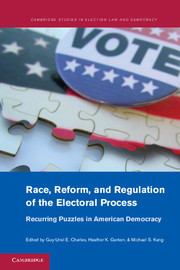Description
Race, Reform, and Regulation of the Electoral Process
Recurring Puzzles in American Democracy
Cambridge Studies in Election Law and Democracy Series
Coordinators: Charles Guy-Uriel E., Gerken Heather K., Kang Michael S.
An edited volume that offers a critical re-evaluation of three fundamental and interlocking themes in American democracy.
Language: English
Subject for Race, Reform, and Regulation of the Electoral Process:
Race, Reform, and Regulation of the Electoral Process
Publication date: 04-2012
312 p. · 15.2x22.9 cm · Paperback
Publication date: 04-2012
312 p. · 15.2x22.9 cm · Paperback
Race, Reform, and Regulation of the Electoral Process
Publication date: 01-2011
312 p. · 16x23.5 cm · Hardback
Publication date: 01-2011
312 p. · 16x23.5 cm · Hardback
Description
/li>Contents
/li>Biography
/li>
This book offers a critical re-evaluation of three fundamental and interlocking themes in American democracy: the relationship between race and politics, the performance and reform of election systems and the role of courts in regulating the political process. This edited volume features contributions from some of the leading voices in election law and social science. The authors address the recurring questions for American democracy and identify new challenges for the twenty-first century. They not only consider where current policy and scholarship are headed, but also suggest where they ought to go over the next two decades. The book thus provides intellectual guideposts for future scholarship and policy making in American democracy.
1. The future of elections scholarship Guy-Uriel E. Charles, Heather K. Gerken and Michael S. Kang; Part I. Race and Politics: Overview Jennifer Hochschild; 2. Voting rights: the next generation Rick Pildes; 3. The reconstruction of voting rights Pamela S. Karlan; 4. Explaining perceptions of competitive threat in a multi-racial context Vincent L. Hutchings, Cara Wong, James Jackson and Ronald Brown; Part II. Courts and the Regulation of the Electoral Process: Overview David Schleicher; 5. The institutional turn in election law scholarship Heather K. Gerken and Michael S. Kang; 6. Judges as political regulators: evidence and options for institutional change Richard L. Hasen; 7. Empirical legitimacy and election law Christopher Elmendorf; 8. Judging democracy's boundaries Samuel Issacharoff; Part III. Election Performance and Reform: Overview Alex Keyssar; 9. New directions in the study of voter mobilization Alan Gerber; 10. Popular election monitoring Archon Fung; 11. Democracy in the United States, 2020 and beyond: how can scholarly research shape a vision and help to realize it? Ned Foley; 12. Partisanship, public opinion and redistricting Joshua Fougere, Stephen Ansolabehere and Nathaniel Persily; 13. Conclusion: more or less: searching for regulatory balance Bruce Cain.
Guy-Uriel E. Charles is a Professor of Law at Duke Law School and the Co-Director of the Duke Center on Law, Race and Politics. Professor Charles teaches and writes in the areas of constitutional law, civil procedure, election law, law and politics, and race. His articles have appeared in Constitutional Commentary, the Michigan Law Review, the Michigan Journal of Race and Law, the Georgetown Law Journal, the Journal of Politics, the California Law Review, the North Carolina Law Review and others.
Heather K. Gerken is the J. Skelly Wright Professor of Law at Yale Law School, where she specializes in election law, constitutional law and civil procedure. Professor Gerken is one of the country's leading experts on voting rights and election law, the role of groups in the democratic process, and the relationship between diversity and democracy. Her work has appeared in the Harvard Law Review, the Yale Law Journal, the Stanford Law Journal, the Columbia Law Review, Political Theory and Political Science Quarterly. Her book, The Democracy Index: Why our Election System Is Failing and How to Fix It (2009), discusses a proposal put into bills by then-Senators Barack Obama and Hillary Clinton and Congressman Steve Israel.
Michael S. Kang is an Associate Professor of Law at Emory University School of Law, where he teaches election law, business associations and a seminar on law and democratic governance. His research focuses on issues of voting, race, election law and political science. Professor Kang's articles have been published by the Yale Law Journal, the NYU Law Review and the Michigan Law Review, among others. He received his JD from the University of Chicago Law School and his PhD in government from Harvard University.
Heather K. Gerken is the J. Skelly Wright Professor of Law at Yale Law School, where she specializes in election law, constitutional law and civil procedure. Professor Gerken is one of the country's leading experts on voting rights and election law, the role of groups in the democratic process, and the relationship between diversity and democracy. Her work has appeared in the Harvard Law Review, the Yale Law Journal, the Stanford Law Journal, the Columbia Law Review, Political Theory and Political Science Quarterly. Her book, The Democracy Index: Why our Election System Is Failing and How to Fix It (2009), discusses a proposal put into bills by then-Senators Barack Obama and Hillary Clinton and Congressman Steve Israel.
Michael S. Kang is an Associate Professor of Law at Emory University School of Law, where he teaches election law, business associations and a seminar on law and democratic governance. His research focuses on issues of voting, race, election law and political science. Professor Kang's articles have been published by the Yale Law Journal, the NYU Law Review and the Michigan Law Review, among others. He received his JD from the University of Chicago Law School and his PhD in government from Harvard University.
© 2024 LAVOISIER S.A.S.

